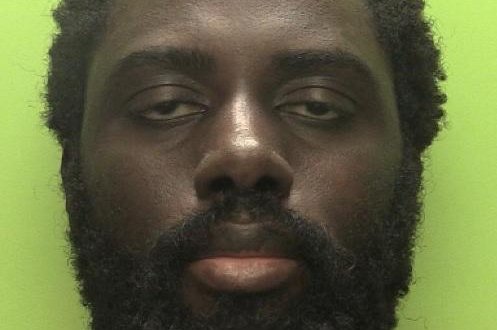
1 of 2 | Valdo Calocane, a former University of Nottingham student, was en route Thursday to a high-security mental hospital on Merseyside after being sentenced to be detained for life under the Mental Health Act for stabbing three people to death in Nottingham in June and attempting to murder three others. File Photo courtesy Nottinghamshire Police
A British court sentenced a mentally ill man who stabbed three people to death in a bloody rampage in the city of Nottingham last year to life in a high-security hospital Thursday, warning it would likely never be safe to release him.
Sitting at Nottingham Crown Court, Judge Mark Turner told 32-year-old Valdo Calocane that he would be detained in a high-security mental treatment facility “probably for the rest of your life,” in accordance with the Mental Health Act. Advertisement
Turner called the random killings of Nottingham University students Barnaby Webber and Grace O’Malley-Kumar, both 19, and school janitor 65-year-old Ian Coates and the attempted murder of three other people, “sickening” crimes that shook Britain and destroyed lives.
“You committed a series of atrocities in this city which ended the lives of three innocent people. Your sickening crimes both shocked the nation and wrecked the lives of your surviving victims and the families of them all,” Turner said. Advertisement
But after hearing days of evidence from the prosecution, defense and psychiatrists, Turner said he was satisfied that Calocane was suffering from paranoid schizophrenia and should therefore serve his sentence in a high-security hospital where he could receive appropriate medical treatment.
Turner said the prognosis that the illness Calocane was suffering from was incurable, due to being “treatment resistant,” meant he was still dangerous.
The Nottingham University mechanical engineering graduate denied murdering the three victims and attempting to murder three other people but pled guilty Tuesday to three counts of manslaughter on the grounds of diminished capacity, which was accepted by the court and victims’ families.
Calocane, originally from Guinea Bissau in West Africa, had a history of mental illness but no criminal record.
However, relatives reacted with anger to the outcome with Webber’s mother, Emma Webber, saying “true justice has not been served,” and accused Nottinghamshire Police of having blood on its hands for failing to arrest Calocane, who was wanted for an alleged assault of a police officer, prior to his killing spree.
“We as a devastated family have been let down by multiple agency failings and ineffectiveness.”
She also said the families had been” rushed, hastened and railroaded” into accepting Calocane’s manslaughter plea. Advertisement
“The premeditated planning, the collection of lethal weapons, hiding in the shadows and the brutality of attacks are of an individual who knew exactly what he was doing. He knew entirely that it was wrong but he did it anyway,” said Webber.
To the assistant chief constable, Rob Griffin, I say you have blood on your hands. If you had just done your job properly, there’s a very good chance my beautiful boy would be alive today.”
Griffin accepted his force could and should have done more but pointed out that even if Calocane had been arrested and brought before a court, he would have been back out on the street again immediately afterward as he was highly unlikely to have been jailed on the assault charge.
Ian Coates’ son, James, said the police, Crown Prosecution Service and mental health services had allowed Calocane to “get away with murder.”
“If this man was not stopped when he was, this could have been one of the most catastrophic attacks this country has ever seen. This man is a killer — murder was the only thing he cared about and he fulfilled this in horrific fashion,” he said.
Dr. Sanjoy Kumar, Grace Kumar’s father, said the family would never come to terms with losing her in the way they did adding that “missed opportunities” to stop Calocane would “forever play on our minds.” Advertisement
He said the the family never doubted the paranoid schizophrenia diagnosis but criticized a lack of toxicology reports and “contemporaneous mental health assessments” during the seven months since Calocane’s June 13 rampage.